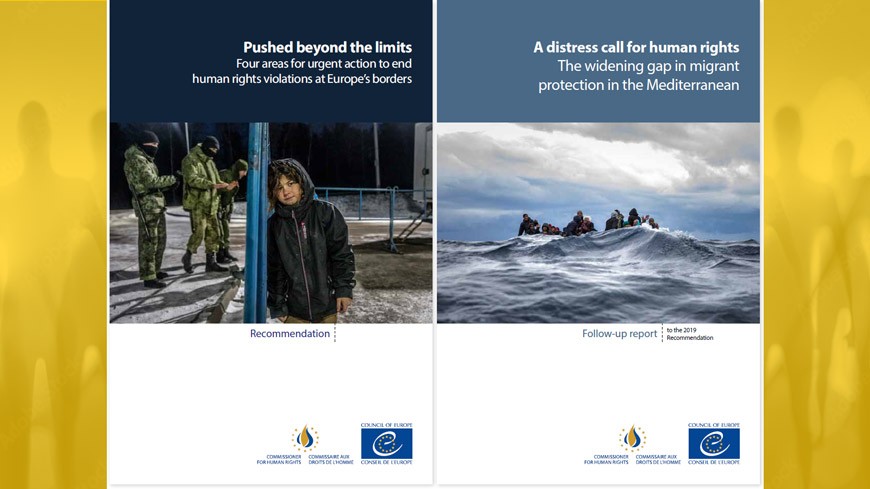In her Activity Report the Council of Europe Commissioner for Human Rights, Dunja Mijatović, devoted a separate chapter to human rights of refugees, asylum seekers and migrants, which refers to her visits, reports, country-specific interventions and several meetings she had in relation to this theme.
“The leaders of EU member states should urgently address the serious human rights violations against refugees, asylum seekers and migrants that have become a permanent feature of migration control practices at many of Europe’s borders", said the Commissioner ahead of the Special European Council of 9 and 10 February.
“Among other things, the heads of state and government of the 27 EU member states are expected to set out new steps to strengthen external borders and enhance co-operation with third countries. However, their meeting comes amid a context of years of steady decline in respect for the human rights of those attempting to reach Europe. Large-scale and often violent pushbacks, denial of access to asylum procedures, disregard for obligations of humanitarian assistance, the facilitation of interception of people at sea and their return to horrific abuse, and the criminalisation and harassment of human rights defenders providing assistance and documenting human rights violations have all proliferated.
Leaders participating in the Special European Council should therefore seize this opportunity to go beyond making references to upholding international obligations. They should express a clear commitment to putting an end to human rights violations occurring as a result of jointly agreed migration management measures. They should break the silence over well-documented abuses by member states and send out a clear signal that human rights violations can never be an accepted part of border control practices. They should furthermore commit to ending support to member state or third country migration control practices that violate human rights, and to strengthening transparency and accountability mechanisms.
She recalled that EU member states are also member states of the Council of Europe, adding that they have made commitments to uphold the Council of Europe’s standards, not least the European Convention on Human Rights. Any decisions at the Special European Council should reflect these commitments, especially as these will set the tone for the way refugees, asylum seekers and migrants are treated, in EU member states and beyond, for the foreseeable future.”
In a letter addressed to the Minister for the Interior of Latvia, Māris Kučinskis, published on 6 February, the Commissioner raised concerns about the reported continuation of pushbacks at the Latvian-Belarusian border which has led to severe injuries suffered by men, women and children and the death of one man.
“I am alarmed by the fact that a criminal investigation was initiated against two members of the organisation ‘I want to help refugees’ who went to the border area on 12 January 2023 out of concern for the lives of seven Syrians", she wrote, stressing the key role of human rights defenders and the duty of states to create an enabling environment for them.
- Read the Commissioner's letter addressed to the Minister for the Interior of Latvia
- Read the reply of the Minister for the Interior of Latvia to the Commissioner's letter
The CommHR also sent a letter to the Minister of the Interior of Italy, Matteo Piantedosi, published on 2 February 2023, in which she called on the government to consider withdrawing or revise the Decree Law No. 1/2023. The Decree’s provisions could hamper NGO search and rescue operations and, therefore, be at variance with Italy’s obligations under human rights and international law. The Commissioner also noted that, in practice, NGO vessels have been assigned distant places of safety to disembark persons rescued at sea, such as ports in Central and Northern Italy.
“The decree and the practice of assigning distant ports to disembark people rescued at sea risk depriving people in distress of life-saving assistance from NGOs on the deadliest migration route in the Mediterranean," wrote the Commissioner.
In addition, the Commissioner reiterated her call on the Italian authorities to suspend co-operation with the Libyan Government on interceptions at sea, as set out in her Recommendation on the Central Mediterranean.
The Commissioner also requested further information about the allegations of returns of persons from Italy to Greece on private ships, where they are reportedly deprived of their liberty in worrying conditions. Drawing on her Recommendation on ending pushbacks in Europe, the Commissioner recalled that carrying out individual assessments of the protection needs of each person arriving at the border remains a crucial safeguard against refoulement.
- Read the Commissioner for Human Rights' letter addressed to the Minister of the Interior of Italy
- Read the reply of the authorities of Italy to the Commissioner's letter (in Italian and French)
Finally, on 24 March the CommHR sent a letter to the speakers of both chambers of the British Parliament, in which she expressed her concern over the Illegal Immigration Bill. She warned that its "provisions create clear and direct tension with well-established and fundamental human rights standards."



